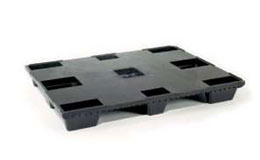Your cart is currently empty!
Don’t Fall Foul of Pallet Export Regulations
It is hard enough to secure export orders at the moment and port authorities delaying consignments on wooden pallets won’t help. But this risk can be avoided, says Jim Hardisty, Managing Director at Goplasticpallets.com.
Most exporters will be aware that timber pallets travelling between over 40 different countries must be specially heat treated and officially accredited in accordance with the international regulation ISPM15*, which covers the import and export of timber pallets. However, they might not know that ISPM15 compliance issues have stalled supply chains on a number of occasions in the last few years, resulting in goods exported on wooden pallets being seized by overseas port authorities.
The latest incident occurred in June this year, when Pallet Link – the UK’s pallet and packaging advisory association – advised its members that the General Administration of Quality Supervision, Inspection and Quarantine (AQSIQ) in China were intercepting export consignments from Europe because articles of WPM (pallets, crates, etc) were found to have country codes within the ISMP15 mark that did not relate to the country of re-export.
The Forestry Commission Plant Health Service was alerted to this issue by a major international freight forwarding company following an incident in which a German (DE) marked pallet, which had been air freighted to China from Austria (AT), was deemed to be non-compliant.
According to the ISPM15 regulations, re-treatment and re-marking of WPM is only required when shipping from one country to another if the WPM has been repaired, but Chinese AQSIQ officials were arguing that WPM must be retreated and re-marked in the country of re-export, regardless of the original treatment and markings.
 The European Commission confirmed in August that this particular incident had been resolved and that AQSIQ officials now agreed with the EU interpretation of the ISPM15. However, this is not the first time that the ISPM15 has been called into question and created an obstacle in the supply chain.
The European Commission confirmed in August that this particular incident had been resolved and that AQSIQ officials now agreed with the EU interpretation of the ISPM15. However, this is not the first time that the ISPM15 has been called into question and created an obstacle in the supply chain.
Previously, a leading pharmaceutical company had a high-value 20-pallet order of Penicillin refused entry by Chinese port officials because of a tiny hole in one of the wooden pallets, despite documents proving that they complied with the ISPM15 heat treatment standards.
 Goods exported on timber pallets can be stopped if its ISPM15 mark is scuffed, if the pallet has surface blemishes or if it’s been repaired and not retreated. Non-compliance with the ISPM15 regulations can be costly for exporters, leading to confiscated goods, missed delivery deadlines and, in some instances, hefty fines.
Goods exported on timber pallets can be stopped if its ISPM15 mark is scuffed, if the pallet has surface blemishes or if it’s been repaired and not retreated. Non-compliance with the ISPM15 regulations can be costly for exporters, leading to confiscated goods, missed delivery deadlines and, in some instances, hefty fines.
 With exports at an all time low, competition to secure valuable export contracts has never been so fierce. Businesses are working long and hard to win orders which require negotiation over many months, completing lengthy export documents and overcoming currency issues. So, the pallets they’re using should be the least of their worries. Exporters shouldn’t need to question whether their pallets are in a good state of repair and safe for export or whether they could be refused entry by overseas port authorities – resulting in unexpected bills for their consignments to be repalleted thousands of miles away by unknown companies and the embarrassment and cost of failed deliveries.
With exports at an all time low, competition to secure valuable export contracts has never been so fierce. Businesses are working long and hard to win orders which require negotiation over many months, completing lengthy export documents and overcoming currency issues. So, the pallets they’re using should be the least of their worries. Exporters shouldn’t need to question whether their pallets are in a good state of repair and safe for export or whether they could be refused entry by overseas port authorities – resulting in unexpected bills for their consignments to be repalleted thousands of miles away by unknown companies and the embarrassment and cost of failed deliveries.
To avoid issues with the ISPM15, there is a simple solution – use plastic pallets. Plastic pallets are exempt from the ISPM15 regulations and lightweight, low-cost models are ideal for export consignments and one-way trips. Plastic pallets also offer the additional benefits of safer handling without nails and splinters, improved hygiene, water-resistance, no mould or dust contamination, and they can also be manufactured from recycled material.
In fact, over 80 per cent of our plastic pallets are manufactured from recycled high-density polyethylene (HDPE). A large number of pallets in our export range also nest, which can save space in storage and cut costs on return journey transportation.
With international shipping costs to the US and Asia exceeding £2,000 per 1,000kg pallet, it makes sense to invest an extra £2 or £3 per pallet – often a tiny fraction of the value of the goods being exported – and buy plastic.
At the moment, there are approximately 70 million pallets in circulation in the UK and around 90 per cent of those pallets are made from wood – but by educating companies about the benefits of plastic pallets, in particular the benefits for export consignments, we hope that overtime plastic will increase its market share.
For further information contact goplasticpallets.com on +44 (0) 1323 744057.
